The congregation was fortunate in that the first
minister seems to have come from a `well to do' family. The Rev
McKee lived in the early years of his ministry in a house in Princes
Street, now number 17. In those days it was a detached house but
later it became part of the terrace. With its double windows and its
Queen Ann fan light it looks different. However, it was not to
remain the Manse for long. About 1850 a Manse was built in
Ballymacormick on land owned by the McKee family. This land had
either been bought by the family of the minister or previously owned
by them. Some of the farm land remained in the McKee name until the
late 1960's, when the remainder of the land was sold. At that time
the congregation was at benefit from the estate.
The manse, built in the early 1850's, was typical
of many large houses at that time � a four-square Georgian type. It
is said that the cost of the new manse was borne by the Rev. McKee
and that the church paid him or his family at a later date as the
congregation grew and money became more plentiful. The manse, like
the Church buildings, was renovated from time to time.
I suppose the best known true story took place
late in the Rev. McKee's successor's ministry. The Rev James
Rentoul, about 1908, asked the Committee to white wash the building.
They delayed, and so Mr Rentoul took the matter into his own hands.
He purchased a barrel of tar and with the help of a tramp tarred it.
The manse became famous overnight. It was known as the `Black Manse'
and it was said it was the `talk of Ireland', with people actually
coming to see it. The writer remembers when he was a student in the
late thirties Professor Marshall of Magee University College telling
the tale of the `Black Manse'. He never thought then that one day he
would live in it. The tarring of the manse proved a very expensive
job for the Church Committee, in that for over fifty years
successive committees spent a small fortune trying to get rid of the
tar. Every time the manse was distempered or painted the tar came
through, giving a pie-bald effect. Finally, in desperation in 1967
the walls were stripped with a pneumatic drill and re-plastered �
the tar had gone for ever! The tar was gone but the moral lingers
on.
James Ervine, of `Ashdene', Church Street, left
his attractive residence to the congregation for a manse. When his
widow died and the house became available, the congregational
committee, after much discussion, decided to sell the house and to
renovate the Ballymacormick Manse.
The renovation and modernization was considerable
and was paid for by the money raised from the sale of `Ashdene'.
(The Church Committee had to have the permission of the Union
Committee for this) Mr Ervine achieved indirectly what he wanted - a
comfortable home for the minister. This work commenced in the Spring
of 1967and was completed by the beginning of October.
In early 1982, after the Rev. Moore had been in
hospital for a time and his retirement was getting nearer, the
suggestion was brought before the Committee that they should
consider selling the manse and building a modern house on their site
on the Ballymacormick Road at the back of the manse. This received
general approval at a meeting held in May 1982.
As Mr Moore had his own bungalow in the area he
could move at a suitable time to enable the Committee to have the
manse ready for his successor. In April 1983 the move was made and
Mr. Moore carried on his work from his own home. Immediately, the
Property Committee began to plan the new manse. The building was
commenced in 1st March 1984 and the house was ready by the time the
Rev. A. Boyd got the Call. It is a fine house with a good view of
the Mournes and the congregation is rightly proud of it
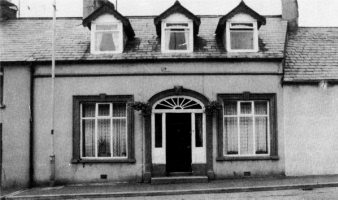 |
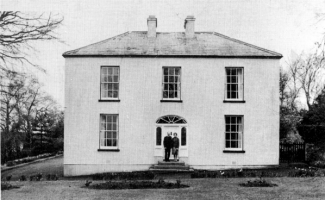 |
|
The First
Manse, 17 Princes Street (1850) |
The Second
Manse (1850-1983) |
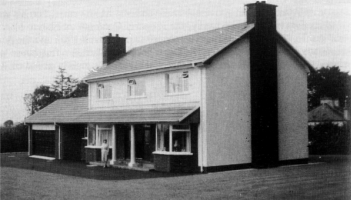
The New Manse

THE KIRK SESSION
The first report to give a list of office bearers
was for the year ending the 31st March 1905. There were at that time
two elders�Robert H. Mackey, and James Archer.
Robert Henry Mackey was known as the Senior Elder,
it is interesting to trace his descendants. He was the grandfather
of the Mackey brothers, James, Fred, and Harry. There are four great
grandsons, Robert, Wilson and Richard, sons of Fred and Andrew, son
of Harry, who also has two daughters, Elaine and Lynn. (All are at
present members of the congregation.)
In 1908 Joshua Magowan was added and when James
Archer died James Tweedie was elected.
After the Rev. McMullan was ordained, an election of
elders was held in October 1917 when five men were ordained:
James Dawson
James A. Doak
Thomas Johnston
Stephen Mercer
James Thompson
In 1930 George Ervine was co-opted from (Magherally).
There was not another election until 1934, when the following were
ordained � Robert J. Kerr, J. H. Tweedie, S. J. Duffy, John
Wilkinson, Henry Smyth and Robert Dawson.
At the time the Rev. Moore was ordained (April,
1946) only three elders remained � S. J. Duffy, J. Tweedie and Henry
Smyth (died May, 1946) � and then there were two!.
On the 29th January 1947 five elders were
ordained�James Ervine, Robert Mackey, James McCormick, Isaac
McCready and William J. Thompson.
In October 1950, S. R. Patterson, B.Com.Sc. was
co-opted and in October 1960 Robert Farquhar.
On the 20th September 1964 six elders were
ordained�Nelson Andrews, Harold Hamilton, F. S. Jones, Thomas Kerr,
James Walker, Cecil Whan.
Fred S. Jones has been on the Church Committee
since 1943. He was appointed convener of the Property Committee the
following year. For over forty years he served the congregation well
in this capacity, supervising the many building projects as well as
the day to day upkeep of the property. Recently Desmond Connery has
taken on this responsibility.
On the 10th January 1971 William Coulter, Beattie
Johnston, Herbert McDonald, John Mercer, Walter Smyth and John
Wilkinson were ordained.
For eighteen years Beattie Johnston photographed
the main events of the congregational year. It was always an
excellent record and the slides were used at the Annual
Congregational Social evening as a reminder of what had taken place.
In years to come the slides, no doubt, will be of considerable
historic interest.
For the fourth, time in the Rev. Moore's ministry
elders were elected and ordained on the 2nd March 1980. They were N.
Kenneth Aiken, Herbert Andrews, Samuel V. Carson and Cyril Latimer.
Mr. Moore who was Moderator of Presbytery that year had the
privilege of ordaining his own elders.

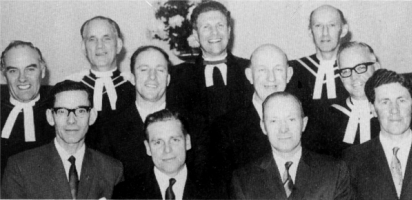
Ordination of Elders, 10th January, 1971
Back row:� Rev. H. R. Moore, Rev.
W. L. McCombe, Rev. A. Watson, Rev. A. P. McComb.
Second row:� Hebert McDonald, Walter Smyth, Rev. J.
B. Irvine. Front row:� Beattie Johnston, John
Mercer, William Coulter, John Wilkinson
SESSION MEETINGS AND
SESSION CLERKS
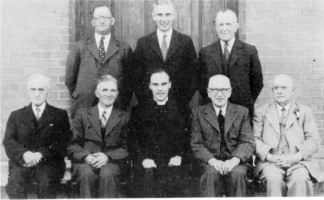 |
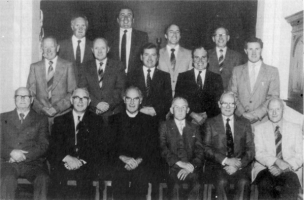 |
|
William Thompson, Samuel Patterson, Robert Mackey, James
Tweedie, Isaac McCready, Rev. H. Moore, S. J. Duffy
(Clerk), James McCormick. Circa 1955. |
The
Kirk Session, September, 1984. Back row:� Samuel Carson,
Kenneth Aiken, Herbert McDonald, Beattie Johnston.
Middle row:� Cyril Latimer, William Coulter, Herbert
Andrews, Jon Mercer, John Wilkinson. Front row:� Harold
Hamilton, Jim Walker (Clerk), Rev. H. R. Moore, Thomas
Kerr, Cecil Whan, Frederick Jones. |
The earliest record of a meeting of the Kirk
Session is the 28th December 1916. It was held to prepare for the
vacancy, that would commence at the beginning of the New Year with
the retirement of the Rev. Rentoul. The Rev. Thomas Doey, Convener
in charge of the congregation, presided. At that meeting there were
three elders, and two Committee members. There were two items of
business, the appointment of a clerk and the drawing up of a list of
voters.
Joshua Magowan, who had been ordained an elder in
1908, was appointed clerk and held this position until his death on
the 12th March 1944 (by then if the last few days of the Rev.
Rentoul's ministry are included he had served as clerk with six
ministers). A week later on the 19th of the month Samuel J. Duffy
was appointed and, like his predecessor. held the office until his
death on the 15th April, 1967. At a special meeting of the Session
held on the 6th June, Samuel R. Patterson, B. Com. Sc., was
appointed clerk. He too was in office until his death in 1982.
The present clerk is James Walker, who was appointed
at the May meeting of the Session that year. Mr. Walker's
forebearers had been foundation members of the congregation. He has
been apppointed to the Committee in January 1962, ordained an elder
in 1964, appointed secretary of Committee in October 1973. He also
taught a senior class in the Sunday School for 20 years. He had a
loyal record of service to the congregation.


Apart from special meetings at the time of a
vacancy or when there was an election of elders or committee the
Session met just twice a year, May and November, to receive new
communicants.
The pattern of these meetings remained the same
and has been followed up to the present time. The new communicants
were introduced, the minister indicated the instruction they had
received and then after a few words of encouragement from an elder
or sometimes a question, they received the Right Hand of Fellowship.
There was a short period in the twenties when the
Session met once a quarter but this was discontinued as there was no
business to transact.
Since the early seventies the Session has been
meeting more often to deal with a great variety of matters.
There are now celebrations of the Lord's Supper
on the first Sunday evening of September and on Good Friday evening
as well as the stated observances in May and November.
During the period from 1946 there was a steady
growth in the number attending the Lord's Supper. The peak was
reached in 1969 when 246 persons attended at least one of the two
communions.
In the early days of the congregation the lead
token was used (see illustration). The first roll book dates back to
May 1910 and it was at that point the change was made and card
tokens were introduced to make the keeping of a roll possible.

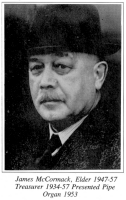 The
congregation, it can be said, was fortunate in its office bearers,
men who gave long and faithful service, men who gladly went the
second mile. Unfortunately we have no records of the very early
years. So we look at those who gave service from the turn of the
century.
The
congregation, it can be said, was fortunate in its office bearers,
men who gave long and faithful service, men who gladly went the
second mile. Unfortunately we have no records of the very early
years. So we look at those who gave service from the turn of the
century.
At that time the post of Secretary and Treasurer
seems to have been combined. In the year 1900 it was held by a D. J.
Spence. In 1905, a secretary and a treasurer were appointed. The new
treasurer was James A. Doak who held the post until April 1934 when
he resigned and left the congregation. He was succeeded by James
McCormick who held the office until his death in October 1957.
On James McCormick's death Cecil Whan, who had
been assistant treasurer, was appointed; like his predecessors he
was a man who played many parts in the work of Banbridge Road. After
20 years he resigned and Kenneth Aiken was appointed on the 3rd
October, 1977. He was ordained an elder in 1980. His hard work and
efficiency are widely appreciated. His views expressed in meetings
of Session and Committee are always of a high quality. He is
regarded widely as a man who always has the good of the congregation
at heart. The Synod appointed him to the Union Commission in 1984.
The first minutes to bear a secretary's name are
dated the 2nd March 1914. They were signed by W. J. Hutchinson and
he held the office until the end of 1927. The Committee recorded its
appreciation in a special minute �"His duties as secretary were
discharged with zeal and efficiency. His attendance at meetings of
Committee was most exemplary, but his work as secretary was only one
of the ways wherein he showed his loyalty and devotion to the
congregation. We sincerely regret his resignation, which we must
perforce accept, but we trust that he may be long spared to serve
his church in such ways as he may find open to him. "
This could be said of many of those who were to
hold office in the years ahead. J. H. Tweedie was appointed and was
in office until March 1939. After this J. Bryson was appointed � he
resigned after two years.
W. J. Thompson was then elected�a man who was to
give abundant service to the congregation. He remained in office
until he died in September 1973.
James Walker was the natural successor and remained
secretary until he was appointed Clerk of Session in May 18, 1982.
In 1947 James McCormick, who had been associated
with the congregation since childhood days, was honoured. As a young
man he had been elected to the Committee and soon became assistant
treasurer � later treasurer. For over 40 years he served the
congregation in this capacity. It was said that his motto was
`Whatsoever thy hand findeth to do, do it with all thy might." On
receiving a silver salver, Mr. McCormick said that it was the
conviction that he was serving Jesus Christ and His church, that was
the source of his encouragement. He continued in office until his
death in 1957.
His assistant, Cecil Whan, became treasurer and
on retiring he too was the recipient of tangible recognition not
only for his work as treasurer but for the many other services he
had rendered the congregation over a period of more than 30 years,
20 of them as treasurer. He received a solid gold watch, suitably
inscribed, a cheque and many good wishes � a well-deserved honour.
There was one other notable presentation and that
was to S. J. Duffy, who had been a member of the Church Committee
for over 40 years, a member of the Kirk Session for 30 years and
clerk for 20 years. In March 1964 the congregation expressed its
grateful appreciation. S. R. Patterson, introducing the
presentation, said: `During your time connected with this
congregation you have contributed in no small way to the growth and
development of the church under the leadership of five of its eight
ministers." The Rev. Moore's comment on the occasion was "No man
could have taken a greater interest in a congregation than that
which had been taken by Mr. Duffy, and in all his work he was
supported by his wife, who always gave of her best for Banbridge
Road. Mr. Duffy received a T.V. set and Mrs. Duffy received a cut
glass vase.

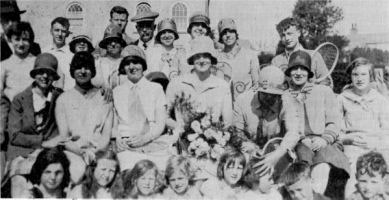
Members of the
Tennis Club 1926. The Rev. Bates (top left);
Mrs. J. C. Wilson wife of Dr. Wilson with a
bouquet of flowers having declared the Club
open for the season
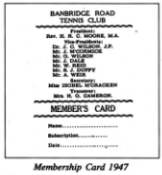 The
Banbridge Road Tennis Club began during the Rev. Bates' ministry in
the Spring of 1926, The flat lawn, in front of the old manse, was
prepared and used as a court. Later a grass court was laid on the
ground at the side of the church. After the building of the hall a
hard court and a second court (grass) were laid out. This in turn
was converted into a hard court. The club flourished until the army
took over the hall during the Second War. After the war, when the
courts became available again, they were resurfaced and the club
revived. However, a series of bad summers followed by the building
of the Minor Hall and the need for a greater car parking area
brought about the end of the club.
The
Banbridge Road Tennis Club began during the Rev. Bates' ministry in
the Spring of 1926, The flat lawn, in front of the old manse, was
prepared and used as a court. Later a grass court was laid on the
ground at the side of the church. After the building of the hall a
hard court and a second court (grass) were laid out. This in turn
was converted into a hard court. The club flourished until the army
took over the hall during the Second War. After the war, when the
courts became available again, they were resurfaced and the club
revived. However, a series of bad summers followed by the building
of the Minor Hall and the need for a greater car parking area
brought about the end of the club.
The club was at its best during the years
immediately before the army took over the hall during the war. The
Rev. Mulholland, who was a keen player, gave the club considerable
support in those successful years.
As is stated elsewhere, the first organization to
use the hall after it was built was the Badminton Club. This was
formed in October 1933 and is still playing a part in the life of
the congregation. It is understood that those early years were very
enthusiastic. Badminton Clubs were not very common in country
churches; � at that time not many had a sufficiently large hall.
Another factor was the difficulty of travelling to play matches �
motor cars were still for the few. If a team wanted to travel, very
often taxis had to be used. So at that time the club was a place of
friendship and very local in its activity.
When the war came the club, like the other
organizations, lost the use of the hall from 1939 to 1945. After the
war when the hall was vacated, the club was re-established, and to
create interest in the sport exhibition matches were arranged. These
were given by T. H. Boyle's team from Belfast, who at the time were
considered the experts and had a fine record. The club, like other
organizations, had its ups and downs, good years and bad years.
However, the interest was maintained and on a number of years
leagues were won � in more recent years the Ballinderry League
(several times) and the Ballyward League.
Miss Winnie Hamilton, who, as secretary of the club
for many years. carried much of the responsibility, deserves a
special mentions.
There was also a Junior Club which attracted a large
number of girl and boys, some of whom became quite skilful players.
Those who took or the responsibility of training the young people
found that the real problem was looking after those who were not
playing and keeping them interested while they waited. For this
reason the Junior Club had an erratic history.
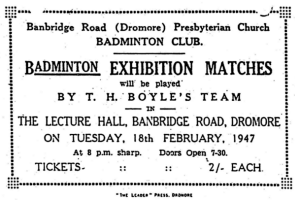

......AND A LAST WORD.
In First Kings Ch. 7 verse 22 we read `And upon
the tops of the pillars was lily work; so the work of the pillars
was finished.' This beautiful work would never be seen or
appreciated by those who entered the great temple of Solomon to
worship, but the work had been faithfully done.
Much of the work in a congregation is not seen
but it is done and well done by faithful hands playing their part
making their contribution; perhaps on the `top of the pillar' not
seen by man but seen and known by God.
In Isaiah Ch 41 verse 7 we read, `So the
carpenter encouraged the goldsmith.' Ministers past and present,
leaders and Sunday School teachers salute their encouragers. They
are not mentioned in this book, but their words, their prayers,
their helping hands sustained those who were bearing the
responsibility.'
Since the end of June, 1988 the following
appointments have been made:�
Mrs. Premila Aiken appointed treasurer,
Miss Sharon Oldham has taken charge of the Anchor Boys,
Dr. Roy McNeice appointed secretary,
Garry Connery appointed Captain of the B.B.,
Mrs. P. Brown secretary of I.B.R.A.
At present the Church Officer is Bobbie Peden who
for the last 15 years has, with his wife, Sylvia, been responsible
for the cleaning of the buildings and the maintaining of the
grounds.
Author's Farewell Address
The Author's Farewell Address in which he
recalled thirty-eight years of the congregation's life and work and
expressed his hopes for its future.
The time has come for me to say farewell �
farewell as your active minister and to step down and let someone
else take the responsibility as minister of this congregation. This
day seemed a long way away on the 4th of April 1946 when I was
ordained and installed as your minister. I will always remember the
wonderful welcome I received. It has been a long ministry, but I can
truthfully say after over thirty eight years, the longer I have been
with you the more attached I have become to this place, so that to
decide to retire was not an easy matter. However, in a sense the
decision was made for me. Indeed nothing would give me greater
satisfaction, or please me more than to be the minister of Banbridge
Road for the next few years, which in this quickly developing area
of ours will be very exciting years and full of promise for the
congregation. I have decided to retire at this time for the very
good reason that I feel no longer able to give the congregation the
time and work it needs. I simply can't cope with all that needs to
be done.

Many of my ministerial friends who have retired
did not give a farewell address and I can understand why. First of
all, it is a very emotional thing to look back over 38 years of work
and relationships, and secondly it is so impossible to say all the
things one would want to say and one ought to say in a short
address. Where does one begin looking back over so many years? The
members who called me to be the minister in this place in early 1946
have mostly passed from our midst and the first fifteen years have
largely been forgotten, yet to me, in some ways, they were the more
exciting � a church building in very bad repair, requiring an
expenditure of �20,000; in to-day's money-value, about 200 thousand
pounds and just 160 families recovering from the war years. It
seemed impossible, but it was done and you have this very beautiful
church in which to worship our God. And then over the next 15 years
our hall was enlarged and additional halls built. I came to the
congregation shortly after the army had handed back the hall. You
wanted organizations and soon we had a G.B., B.B. and P.W.A. as well
as the Tennis and Badminton Clubs revived. They had been suspended
during the war years. Against this background of organizations
commencing and renovations being planned and carried out, we needed
families and this began to happen, slowly at first, but in recent
years more quickly until to-day the congregation has virtually
doubled. I want to pay my tribute to the loyalty of our families. A
congregation can do without many things, but not without loyal and
faithful members. I acknowledge with grateful thanks your loyalty to
me and to Banbridge Road and I pray that you all may be given a
vision of loyalty to sustain you during the vacancy. Under my
successor with loyalty and dedication this congregation can achieve
very wonderful things in the years ahead for God and the advancement
of His Kingdom. Your congregation is worthy of your support and
endeavours. `Ask not what it can do for you, but what you can do for
it.' Give it your best in love and service. It will be blessed and
so will you.
I am not going to spend more time surveying the
past for it would lead us to think of those worthy people who have
dropped out of our ranks, people who loved and worked for the good
of this place; it would lead us to think of the sacrifices of the
years and tinge our hearts with sadness. I feel at this time our
hearts should be full of rejoicing and gratitude to God for we have
so much for which to be grateful, by way of material blessings and
spiritual enrichment. Here we are at this point in time, a strong
fellowship with organizations to suit all ages and tastes. Your
elders and committee capable men and women who have the good of the
congregation at heart, but in view of the size of the congregation
now, they will need to be strengthened in the near future. I thank
them as I do all the leaders, office bearers and Sunday School
teachers who have given me so much help and support, not forgetting
the choir and organists who lead our worship so fittingly.
So then at this milestone where one journey ends,
while being grateful for the past, it is important that you as a
congregation look forward to the road of promise and opportunity
which stretches before you. In adopting this attitude and spirit you
can best serve your congregation and the one who in providence of
God will minister here. That was the attitude of those kindly people
in 1946 and I shall never forget all the tolerance and goodwill
which I received in those early days and throughout the years. From
all I have experienced I know your prayers and goodwill, will buoy
me up at a time like this which is inevitably tinged with sadness.
For the great tasks ahead of this congregation commit yourselves
with diligence. Grasp the new opportunity and go forward. If you,
want a text, it is found in Exodus Ch. 14. The voice of God said to
Moses. `Speak to the children of Israel that they go forward' I feel
that God is saying to you as a congregation of God's people `Think
of the future and go forward knowing that God will guide you.'
People are inclined to say at a time like this things will never be
the same again and of course in a sense they never are the same
again. Together we had our way of doing things and getting things
done. You and my successor will do things differently and I am sure
much better. If you have any love for me see that this church is as
full every Sunday for my successor as it is for me today and you can
begin by practising this during the vacancy. The basic thing as you
face the future is to make sure that God is guiding you. There will
be changes. Those who refuse to accept change cannot be guided
anywhere by anyone.
Think what this congregation can achieve and how
Christ's Kingdom can be extended under fresh dynamic leadership. It
can leap forward into the years ahead. Make sure you have spiritual
vision, without that all your success will turn to dust and ashes.
It was once said of some people `they have forsaken Christ and
turned to His service instead.' Keep the `instead' out of your life.
Let the Christ be the beginning and the ending of all your
endeavours. Let your heart and life be filled with goodwill and let
your goodness be infectious.
I want to put my closing message in this way. It
may be that you are facing a time when life is difficult and you are
feeling inadequate and hopeless. Here are some words from a Harley
Street psychiatrist. The patient was telling the doctor how his life
had crashed in upon him. He was full of guilt and blaming himself
bitterly for his sad state. The psychiatrist said something very
simple yet so very profound. `If a man slips on a banana skin on the
footpath and falls crashing to the ground, what does he do. He
doesn't lie there. He gets up, he kicks the banana skin into the
gutter and then he goes on'. We have all done things we regret. We
have all fallen to the ground and hated ourselves for our fall, but
thank God for the Gospel of His Redeeming Love which urges us to
accept forgiveness, to rise, and live again. Don't let us keep
dwelling on our failures, our faults and falls. Let us rob them of
any further power to hurt us. (Let us) kick them into the gutter and
go forward God supporting us.
And now I must say farewell. Thank you for all
your love and loyalty: your prayers and support. I shall never
forget you all. Move forward now to new tasks, new adventures for
God, the God who was with you in the past and who already beckons
you to go forward into the future with promise. At this point in
time you and I can both say:
March on my soul with strength
He who has led will lead
While year succeedeth year
And as thou goeth on thy way
His hand shall hold thee day by day.
I say farewell, I say it as a prayer for you: May you FARE WELL
This address was preached by the Rev. H. R. Moore on
the 23rd September, 1984.